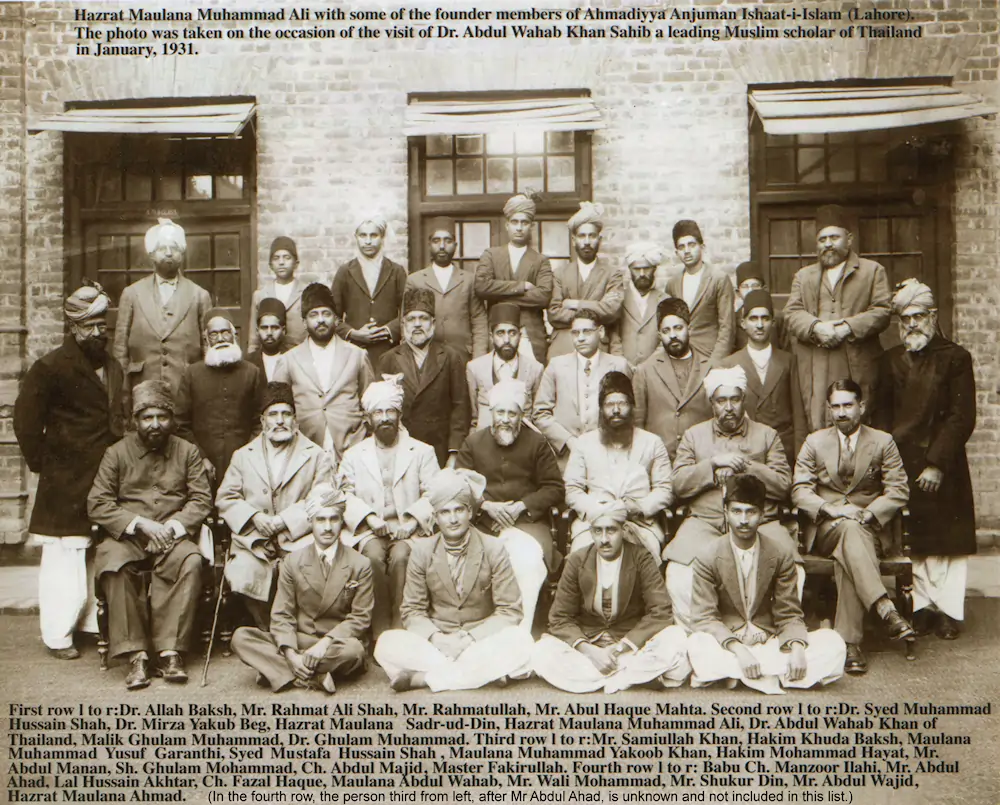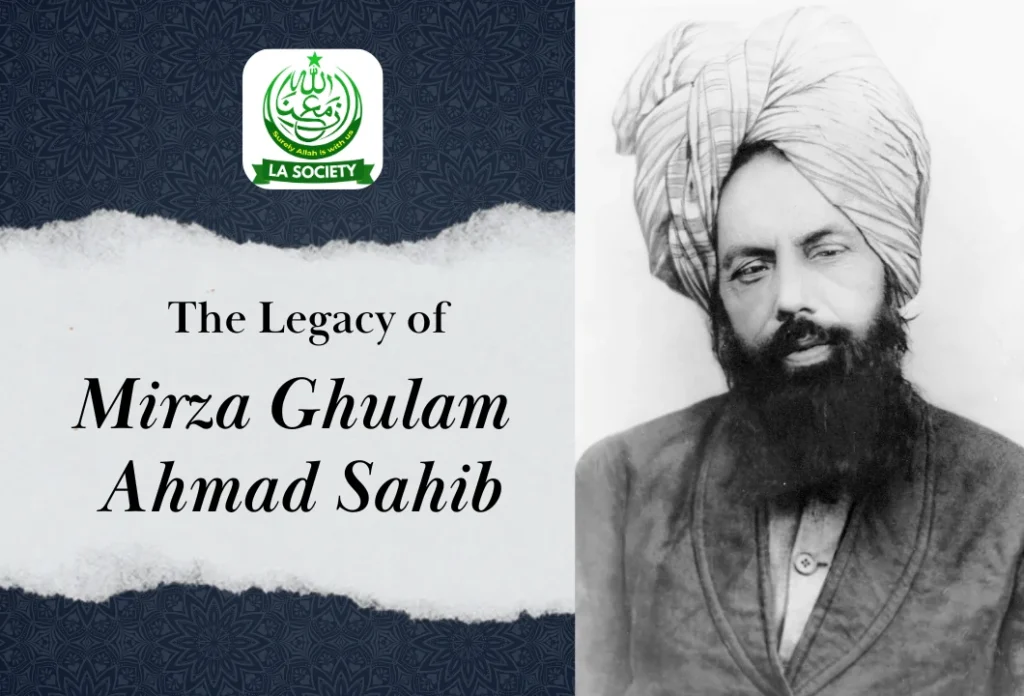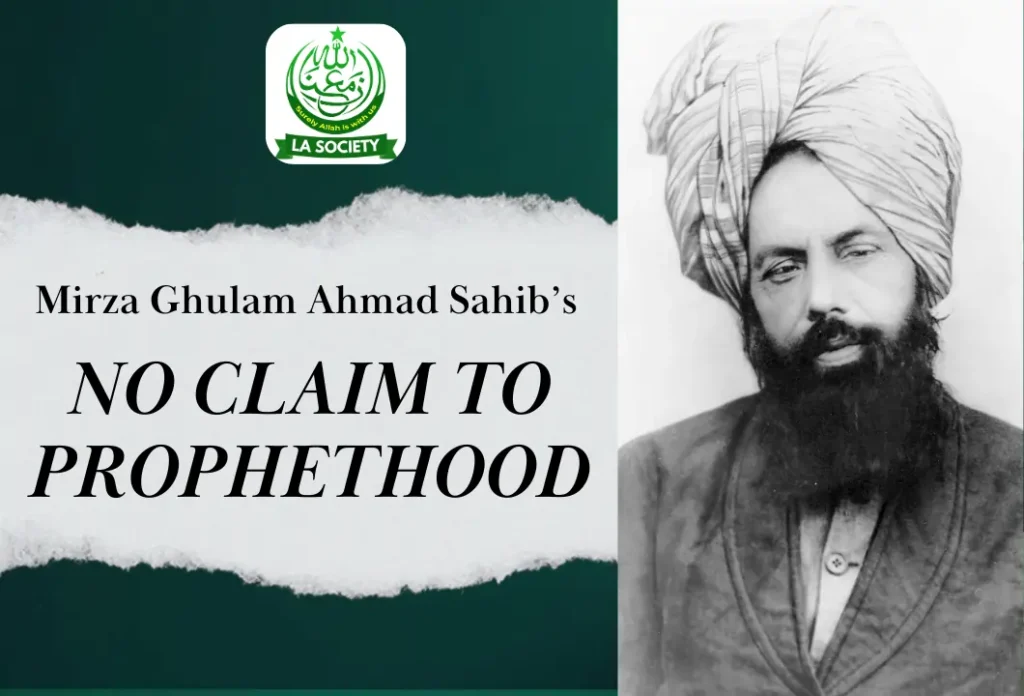
The Lahore Ahmadiyya Movement—widely recognized through its official arm, Lahore Ahmadiyya Society ( LA SOCIETY ) — is a global Islamic organization dedicated to spreading Islam’s true and peaceful message based on the Holy Quran and the life of Prophet Muhammad (PBUH). As a non-political, reform-oriented movement, it emphasizes rational interpretation, intellectual freedom, and interfaith harmony. With its foundations in truth and scholarship, it strives to present Islam as a religion of peace, reason, and universal brotherhood.
Formally known as the Ahmadiyya Anjuman Isha’at Islam Lahore, or AAIIL, this organization represents the intellectual and missionary wing of the movement. It operates worldwide to translate Islamic teachings into contemporary languages, engage in scholarly discourse, and publish literature clarifying misconceptions about Islam.
The Lahore Ahmadiyya Movement traces its origins to the teachings of Hazrat Mirza Ghulam Ahmad (1835–1908), a devout Muslim scholar and reformer from Qadian, India. Claiming to be the Promised Messiah and Mahdi, he presented himself not as a new prophet but as a mujaddid (reviver) of Islam, sent to rejuvenate the faith in an era dominated by Western materialism, Christian missionary activity, and internal decay within the Muslim world.

After the death of Mirza Ghulam Ahmad’s first successor, Hakeem Noor-ud-Din, a division arose in 1914. One group, under Maulana Muhammad Ali, believed in continuing the mission without declaring Mirza Ghulam Ahmad a prophet. This group formed the Lahore Ahmadiyya Jamaat, which eventually became globally known for its peaceful message and scholarly work.
Some key milestones include:
A towering figure in the history of the Lahore Ahmadiyya Movement, Maulana Muhammad Ali (1874–1951) dedicated his life to reviving Islam through intellectual and literary excellence. His most notable work is the English translation of the Holy Quran, accompanied by a detailed commentary that is still regarded globally for its clarity, depth, and authenticity. Maulana Muhammad Ali also translated the Quran into Urdu and authored dozens of influential books, including The Religion of Islam, A Manual of Hadith, and The Early Caliphate.
As the first Secretary of the Ahmadiyya Anjuman Isha’at Islam Lahore (AAIIL), he laid the foundation for its mission of peaceful propagation and scholarly outreach. His leadership emphasized that Mirza Ghulam Ahmad was a Mujaddid (reformer) and never a prophet—affirming the finality of Prophet Muhammad (PBUH). Under his guidance, the movement blossomed into a global force for Islamic understanding.
Another early leader, Khwaja Kamal-ud-Din, was pivotal in expanding the movement’s reach beyond South Asia. In 1913, he founded the Woking Muslim Mission in the United Kingdom—one of the first Islamic centers in Europe. The Woking Mosque became a hub for Islamic lectures, interfaith dialogues, and Friday sermons in English.
Kamal-ud-Din’s lectures, public debates, and written works captivated audiences in Britain and Europe, positioning the Lahore Ahmadiyya Jamaat as the intellectual vanguard of modern Islamic thought. His writings echoed the movement’s emphasis on rational belief, universal brotherhood, and peaceful co-existence.
At the heart of the Lahore Ahmadiyya Movement lies an unshakeable commitment to the Quran and the Sunnah (traditions of the Prophet Muhammad PBUH). The movement believes that all essential Islamic teachings are preserved within these sources, and that the Quran alone serves as the final authority in matters of faith and guidance. Scholars within AAIIL have consistently emphasized a rational, non-sectarian interpretation of scripture—welcoming open dialogue and modern insights without compromising Islamic fundamentals.
One of the most defining beliefs of the Lahore Ahmadiyya Jamaat is the unwavering acceptance of the finality of Prophet Muhammad (peace be upon him). Unlike other sects, AAIIL affirms that no prophet can come after Muhammad (PBUH).
We consider Mirza Ghulam Ahmad a mujaddid (reformer) and not a prophet, which places them in line with mainstream Islamic beliefs. This theological distinction has allowed the Lahore Ahmadiyya to maintain dialogue with broader Muslim communities while continuing their reformist agenda.

Hazrat Mirza Ghulam Ahmad was regarded by the Lahore Ahmadiyya as a reviver of the faith, not as a founder of a new religion. He aimed to counter Christian missionary arguments, combat atheism, and purify Islamic practices of innovations. His role was similar to that of classical Islamic reformers, tasked with renewing the understanding of Islam every century. Through his writings and debates, Mirza Ghulam Ahmad upheld Islamic unity, the miraculous nature of the Quran, and the moral excellence of Prophet Muhammad (PBUH).
The Lahore Ahmadiyya Jamaat, organized under the AAIIL, functions as a non-political, charitable, and educational body. It focuses on:
Headquartered in Lahore, Pakistan, it has autonomous branches across Asia, Europe, Africa, and North America. Despite facing religious discrimination in some countries, the organization continues to grow in influence due to its academic rigor and moral clarity.
LA SOCIETY is the modern digital face of the Lahore Ahmadiyya Movement. It serves as a central platform for global communication, literature access, event updates, and educational resources. Through its official website, social channels, and online library, LA-SOCIETY allows both Muslims and non-Muslims to explore Islam in a clear, respectful, and scholarly manner. Whether it’s sharing the works of Maulana Muhammad Ali, answering theological questions, or offering Quranic studies online, LA-SOCIETY exemplifies the movement’s adaptability to the digital age.
As the world moves rapidly into the digital age, the Lahore Ahmadiyya Movement remains ahead through the visionary work of the Islamic Institute of AAIIL, the official digital media team of LA-SOCIETY. This modern initiative is exclusively responsible for producing, managing, and publishing the Jamaat’s message across various platforms using high-quality Islamic multimedia.
Under the direct supervision of the Ahmadiyya Anjuman Isha’at Islam Lahore (AAIIL), the Institute carries out a wide range of digital activities such as:
Through this dynamic platform, the movement’s mission is conveyed in over 16 languages via Instagram and other platforms—bridging hearts and minds across cultures.
One of its flagship projects is QuranTV, a series of bilingual videos that combine Arabic-English recitations with captivating visuals and scholarly commentary, designed to make the Quran accessible to a global audience.
💻 Explore the Islamic Institute of AAIIL: https://aaiil.online
One of the most iconic contributions of the Lahore Ahmadiyya Movement is the first-ever English translation of the Holy Quran by a Muslim scholar—Maulana Muhammad Ali. This work, completed in 1917, was not only a translation but also a comprehensive commentary, clarifying meanings, providing historical context, and refuting common misconceptions.
His translation remains widely respected even today by scholars across denominations. It has been reprinted countless times and continues to serve as a foundation for Islamic learning in the English-speaking world.
In addition to the Quran translation, the Lahore Ahmadiyya Jamaat has published hundreds of books, magazines, and research papers on topics like:
These resources have provided clarity, countered extremism, and introduced Islam’s rational and peaceful side to both Muslims and non-Muslims alike.
Today, through the LA-SOCIETY platform and its affiliate sites like AAIIL USA, Islam for All Mankind, and Ahmadiyya.org, the movement offers:
These resources reflect the Jamaat’s long-standing commitment to education, accessibility, and da’wah based on scholarship.
From its early years, the Lahore Ahmadiyya Movement demonstrated a visionary approach to global Islamic outreach. Under the guidance of pioneers like Khwaja Kamal-ud-Din, the movement established the Woking Muslim Mission in the UK—the first major Islamic center in Western Europe. This mission became a hub for converting and educating new Muslims, publishing Islamic literature, and fostering interfaith understanding.
Missions soon followed in:
These centers became beacons of Islamic scholarship and peaceful da’wah, long before digital communication existed.
The Lahore Ahmadiyya Jamaat has been a pioneer in interfaith dialogue, participating in global forums that promote religious harmony. Their scholars and representatives have:
Through calm, scholarly reasoning and deep respect for other faiths, the Jamaat has upheld Islam’s true spirit of tolerance and pluralism.
In the modern era, the movement continues its da’wah through:
Their global impact today is multiplied via digital projects from LA-SOCIETY.org and the Islamic Institute of LA-Society, making the Lahore Ahmadiyya Movement one of the most tech-savvy Islamic reform movements active today.
Although both groups stem from the original movement led by Mirza Ghulam Ahmad, the Lahore Ahmadiyya Movement and the Qadiani Jamaat differ in crucial theological points.
The Lahore Ahmadiyya Jamaat:
__
The Qadiani group, on the other hand:
These doctrinal differences make the Lahore Ahmadiyya Movement more aligned with mainstream Islamic thought, especially in terms of prophethood and the interpretation of the Quran.
The Lahore Ahmadiyya Jamaat operates without a centralized Khalifa or dynastic leadership. Instead, it is governed by elected committees, emphasizing:
This democratic and non-authoritarian approach to religious leadership allows open scholarship, avoids sectarian divisions, and emphasizes the universal brotherhood of Islam.
Despite its peaceful message and commitment to orthodox Islamic teachings, the Lahore Ahmadiyya Movement has faced significant challenges—particularly due to widespread misconceptions about its beliefs and objectives.
In some countries, Ahmadis as a group have been wrongfully labeled as non-Muslim, despite clear affirmations from the Lahore Ahmadiyya Jamaat regarding:
These misunderstandings have led to legal discrimination, social boycott, and limited access to platforms for dialogue. Nonetheless, the movement has persisted with dignity, clarity, and unwavering commitment to truth.
Rather than reacting with hostility, the Lahore Ahmadiyya Jamaat has responded with:
Organizations such as LA-SOCIETY.org and the Islamic Institute of LA-Society have created safe spaces online for authentic Islamic learning, supporting members and curious seekers alike.
Despite restrictions, they continue to expand globally, publish powerful works, and operate on the principles of:
This resilience is a testimony to the strength and sincerity of the Lahore Ahmadiyya Movement, which has never compromised its principles, even in the face of systemic pressure.
The scholarly legacy of Maulana Muhammad Ali, the intellectual force behind the Lahore Ahmadiyya Jamaat, continues to shape global Islamic reform. As the first Muslim to translate the Quran into English with a complete commentary, his work remains a milestone in modern Islamic literature. Through publications like The Religion of Islam and A Manual of Hadith, he laid the groundwork for presenting Islam as a rational and peaceful faith.
His teachings now form the intellectual backbone of LA-SOCIETY, which disseminates his work via global digital platforms, ensuring these principles reach today’s thinkers, students, and da’wah workers.
👉 Read more about Maulana Muhammad Ali’s translations and commentaries.
Scholars across the Muslim world and beyond have acknowledged Maulana Muhammad Ali’s contributions to Quranic studies and Islamic outreach. His translation of the Holy Quran is recognized for its:
Even critics of the Ahmadiyya movement have admitted the literary and theological excellence of his work.
Organizations like Lahore Ahmadiyya Society continue to preserve his teachings through digital republishing, multimedia courses, and global campaigns aimed at reconnecting people with the original, peaceful message of Islam.
His legacy is not only in books—but in the very spirit of dialogue, learning, and integrity that defines the Lahore Ahmadiyya Jamaat to this day.
The Lahore Ahmadiyya Movement is a peaceful Islamic organization established in 1914, focused on promoting Islam based on the Quran and the teachings of Prophet Muhammad (peace be upon him). It operates globally under the umbrella of the Ahmadiyya Anjuman Isha’at Islam Lahore (AAIIL) and its modern digital platform, LA-SOCIETY.org
Maulana Muhammad Ali was a leading Islamic scholar, translator, and reformer. He was the first Muslim to publish a full English translation of the Holy Quran with commentary. His works continue to inspire the teachings and publications of the Lahore Ahmadiyya Jamaat and are available on our website Resources Section.
No. The Lahore Ahmadiyya Jamaat believes that Mirza Ghulam Ahmad was a mujaddid (reformer), not a prophet. The movement affirms the finality of Prophethood with Muhammad (peace be upon him) and distinguishes itself clearly from other sects that claim otherwise. More info: MGA Section, Research Paper.
Lahore Ahmadiyya Society (LA-SOCIETY.org) is the modern identity and digital arm of the Lahore Ahmadiyya Movement. It manages online da’wah, global publications, multilingual outreach, and projects like QuranTV, which brings Quranic translations to digital platforms.
The Lahore Ahmadiyya Jamaat differs theologically by rejecting the claim of prophethood for Mirza Ghulam Ahmad and maintaining a democratic, non-Khilafat structure. It aligns more closely with mainstream Sunni doctrine and emphasizes scholarly reform rather than political leadership.
The Lahore Ahmadiyya Movement, rooted in truth, rationality, and compassion, continues to be a torchbearer of Islamic reform and revival. Through its core organization, the Ahmadiyya Anjuman Isha’at Islam Lahore (AAIIL), and the digital platform LA-SOCIETY, the movement has not only preserved the legacy of great thinkers like Maulana Muhammad Ali and Mirza Ghulam Ahmad, but has also carried their vision into the modern age.
It stands as a reminder that Islam is a religion of peace, intellect, and universal values. Through publishing groundbreaking works, participating in interfaith dialogue, and innovating digital da’wah through projects like QuranTV, the Lahore Ahmadiyya Jamaat is quietly shaping hearts and minds around the world.
Whether you’re a seeker, a scholar, or someone curious about the deeper essence of Islam—LA-SOCIETY welcomes you to explore its content, reflect on its message, and join in its global mission of spreading light through knowledge.

